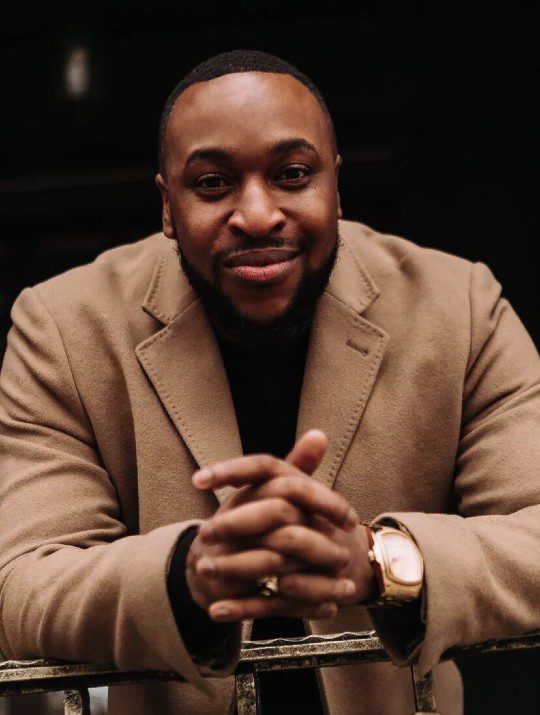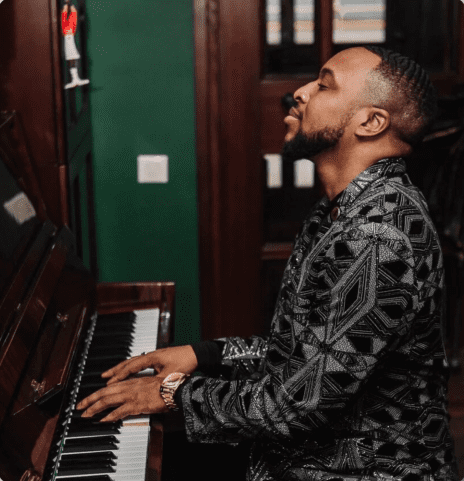Aaron Myers “How Can I ?”
Aaron Myers is a Jazz musician, bisexual, politician, activist, and veteran. He is the music director at an all-inclusive church in Washington DC and has just released a wonderful album just in time for Pride. He grew up in East Texas in the middle of virulent racism, and homophobia. He served in the army and got involved in politics, however, Jazz is his weapon of choice to try to change the world.
I had been expecting this album from his teaser on it months ago, and I was not disappointed. Myers is just as eloquent a speaker as he is a talented musician. He covers topics of love, homophobia, shame, fear, and dying, and how important it is to be proud of who you are through all of it. He is a long-time reader of Instinct and was overly thrilled to be interviewed.

JH: So, Aaron, thanks for reconnecting, I have been looking forward to this, especially now that I have the new album. I got to listen to the whole thing now, and it is a definite winner.
AM: Thank you, I hope you got to see the visual album as well. I am very proud as an artist to get up to number 4 on iTunes on release day. And today “Downbeat” had an article on it as well, for those of you who don’t know Jazz, “Downbeat” is our bible, so that was good to have some coverage from them too. We will also have the Center for Black Equity doing a talkback advocating for black rights during pride month in that gay space. I was reminded by a friend in Texas that “We Shall Overcome” not “We HAVE Overcome”.
JH: That is how I feel right now, I thought we “Almost” did it, and got so far, only to see how far we didn’t. BUT, I am glad to hear about your neighbor getting evicted.
AM: YES!!!!! People tried to help him move, people brought boxes and were excited to know that we were getting a new occupant and that his lease had run out. Even to that, the day of the inauguration, I watched it from bed, because for those people who had been advocating and using their music to speak truth to power, for the last four years, it was as if we were holding the line. I am not ashamed to admit that on the morning of his inauguration, I was exhausted. I wasn’t just happy to have somebody different in the office but I just needed a breather. I don’t think that anyone who has lived as an empathizing adult will forget the last four years.
JH: So, I wanted to tell you, I was listening to the song “Return to Spain” on the exercise bike this morning, and I LOVED it, and you were going pretty much bonkers on the piano, and you said before that you were pushing for that. Were you going freestyle?
AM: Well, “Spain” the original by Chick Corea was a song that always put me in a very good space. So on the second album, I had done with the lyrics that Al Jarreau had used ironically. In an old apartment that I had lived in, they had a baby grand in the lobby, and every time I would walk past, I would play a little of that song. And I thought about it one day, “If Spain was a conversation, how would one reply to it?”, and when you reply to a statement, you are talking about the same subject matter, but there is some tinge or recapping of what you heard. So if anyone listens to “Spain” it’s not “Spain” but it’s a response to it. And its place on the album is to offer a bit of what they call “A lite fare” because even through all the stuff we go through we do enjoy a bit of light fare. I am reminded of the documentaries of the coal miners and there was always a watering hole, still covered in black dust, but they would still enjoy some lite fare. And yes we went completely free. We also went completely free in “New Jim Crowe” we wanted to represent the organized chaos of what happens in the unfortunate incident when bad police stop happens. Ironically I was on my radio show when I had been informed that Chick Corea had just passed via social media. So I changed my whole program and was the first to announce on the radio of his passing. And that song was what I imagined my response would be to “Return To Spain”.
JH: So, I was dying to hear the Pride Album, and that you mention Al Jarreau, I could hear some of that in “Please Take Care of You”.
AM: “Please Take Care of you For Me” was written as a tribute to a friend of mine, one Sunday after church, she expressed to me that her doctor had told her she had 6 months to live, and that was 3 months prior. We had already seen a lot of funerals that did not go over well, they were practical disasters. She wanted me to sit down with her and her wife, and plan out a tribute that would express her final wishes. And we planned out the situation. However I was on tour in Russia when she died, so when I got word that she was entering into her final stage, I sang the song “If I can help somebody”, and I sang that acapella on my phone, so she could hear that before she passed away. But we were able to fulfill what she wanted to have happened in the final service. Her parting words to me, and many other people, were “Please take care of you for me, and I’ll take care of me for you”.
JH: Well sounds like a very welcoming church.
AM: YES, Covenant Baptist United Church of Christ is a welcoming affirming and inclusive church here in Washington DC. The church is a shining testament as to what can happen with you remove any barriers of stigma when it comes to love in the true sense of the word. I have been their minister of music now for 10 years, and we lead the way for marriage equality in the faith sector here in Washington DC. We also were facilitators for the HRC “Safe Space” program they had for religious leaders who wanted to have safe space conversations. The pastor there in the 80s was the first pastor that would baptize people who were living with HIV/AIDS, it was a testament to his inclusivity and love. Right now it’s all done on ZOOM, because we believe in science too, and everyone is welcome to join us that way.
JH: Yeah, you seem to have kept hope, me, I lost it, over a lot of reasons, not just because I learned that my religious beliefs were false, but that I was able to see that Christianity and the “Message of Jesus” really parted ways a long time ago, and I see that “Christians” today are sometimes just awful people treating people badly that are different from them. So, to see a church working to create a place of hope for the black queer space, though I don’t believe anymore, I do hope someone can go and find hope there.

AM: I am happy to be part of a faith that says for me to participate, I do not have to step on anyone else rights. But through this pandemic and other experiences, I have come to understand that there is so much that was out of peoples’ peripherals. I hoped when I wrote the book “White People Talking to White People” that I could take that human pain from their peripherals to their pervue. I wanted people to know that we are complex beings, with a myriad of feelings. There have been times that I have wanted to feel loved, I have wanted companionship. I lost my relationship at the beginning of this pandemic. I felt in my heart of hearts that I could not be alone in feeling this way. So I wrote the book “Bi The Way, Tall Tales and Lessons learned”, to let you know how it feels coming out as a bi person every year, we are the least visible, bi people are the redheaded stepchildren of the LGBT, we are the ones that nobody wants to invite to the party.
JH: You’re right, bisexual men don’t get much visibility in the queer community. I mean, the porn industry made it more accepting of bisexual women, but men are not “Seen” very often. I remember you told me about being in the military with “Don’t ask, Don’t tell”, and here you are now, where you aren’t hiding it, but you are still not being seen really, as who you are. But I can look at you and say, “ok, there is a man of color” but I can’t look at anyone and say “That person is gay, or bi”. I know you have as much respect as the rest of the queer community from all of us, but yeah, not seen. But I want to tell you that I “SEE” you.
AM: You know, I have never said this publicly, but I felt that my sexuality made me “Tainted” to be with women and that it was a stain upon my being, and that it was something that I would have to protect a woman from if I ever would be with a woman. My prayers would always start with “I’m sorry” as now they start with “Thank you”, I can only speak of my experience as a black bi man, no one ever communicated to me what was “ok” how to maneuver, to approach somebody you like, and tell them the truth about who you were, and not dropping a nuclear bomb on what COULD be the start to something good. There were no examples that in a healthy medium, and add the layer of faith, it was always the piece of something that you prayed would go away, and be free from. And you wanted to be free from it, and lose your sense of community. It has only really been since 2010 that we have created a safe space for the conversation.
The full interview can be heard here.
https://stickyjazz.sounder.fm/episode/aaronmyers

